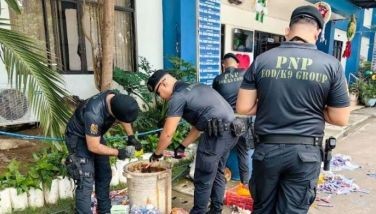DILG: Radaza can't close tricycle lanes
September 19, 2005 | 12:00am
The Department of Interior and Local Government recently ruled that Lapu-Lapu City Mayor Arturo Radaza exceeded his authority when he suspended the implementation of an ordinance designating a tricycle lane in the city.
DILG Secretary Angelo Reyes issued the legal opinion, upon the request of the presidential assistant for tricycle transport affairs, over the legality of Radaza's issuance of an executive order suspending such ordinance.
In 1997, the city council enacted ordinance no. 299-97 designating the tricycle lane and allowing tricycles to ply the major thoroughfares in the city. But Radaza ordered this suspended this year.
Tricycles have since then been banned from plying the M.L. Quezon National Highway, from barangay Poblacion to the Airport Road and the Circumference Road, and from Marina Mall in barangay Pusok to barangays Maribago, Marigondon, Suba-Basbas, Babag, Calawisan, Looc and Poblacion.
Radaza's contention was that the National Highway Code prohibits the operation and passage of tricycles for hire in any national highway in the country.
He defended further his move to suspend the ordinance saying it was in response to the clamor of the public to solve the traffic congestion in the city's highways that has been caused by the entry of at least 600 tricycles in those roads.
The Lapu-Lapu City Confederation of Tricycle Operators and Drivers Association however complained that Radaza issued the order only after they staged a transport strike to demand a fare increase.
This prompted Ariel Lim, presidential special assistant for tricycle transport affairs who also heads the National Confederation of Tricycle Operators and Drivers Associations of the Philippines, to seek the legal opinion of the DILG over the action of the mayor.
Reyes said the Local Government Code is very clear in saying that the legislative power of a city is vested in the city council, which also has specific prerogatives regulating the operation of tricycles within its jurisdiction.
While Radaza may issue an executive order under the local government law, he can exercise such power solely for the purpose of a "faithful and appropriate enforcement and execution of laws and ordinances," Reyes said.
Reyes declared Radaza is not empowered by law to suspend the implementation of an ordinance, otherwise it would be tantamount to giving premium to an invalid encroachment on the powers of the legislative council.
An ordinance can only be repelled by another ordinance from the same council or by an act of Congress, he explained. - Rene U. Borromeo
DILG Secretary Angelo Reyes issued the legal opinion, upon the request of the presidential assistant for tricycle transport affairs, over the legality of Radaza's issuance of an executive order suspending such ordinance.
In 1997, the city council enacted ordinance no. 299-97 designating the tricycle lane and allowing tricycles to ply the major thoroughfares in the city. But Radaza ordered this suspended this year.
Tricycles have since then been banned from plying the M.L. Quezon National Highway, from barangay Poblacion to the Airport Road and the Circumference Road, and from Marina Mall in barangay Pusok to barangays Maribago, Marigondon, Suba-Basbas, Babag, Calawisan, Looc and Poblacion.
Radaza's contention was that the National Highway Code prohibits the operation and passage of tricycles for hire in any national highway in the country.
He defended further his move to suspend the ordinance saying it was in response to the clamor of the public to solve the traffic congestion in the city's highways that has been caused by the entry of at least 600 tricycles in those roads.
The Lapu-Lapu City Confederation of Tricycle Operators and Drivers Association however complained that Radaza issued the order only after they staged a transport strike to demand a fare increase.
This prompted Ariel Lim, presidential special assistant for tricycle transport affairs who also heads the National Confederation of Tricycle Operators and Drivers Associations of the Philippines, to seek the legal opinion of the DILG over the action of the mayor.
Reyes said the Local Government Code is very clear in saying that the legislative power of a city is vested in the city council, which also has specific prerogatives regulating the operation of tricycles within its jurisdiction.
While Radaza may issue an executive order under the local government law, he can exercise such power solely for the purpose of a "faithful and appropriate enforcement and execution of laws and ordinances," Reyes said.
Reyes declared Radaza is not empowered by law to suspend the implementation of an ordinance, otherwise it would be tantamount to giving premium to an invalid encroachment on the powers of the legislative council.
An ordinance can only be repelled by another ordinance from the same council or by an act of Congress, he explained. - Rene U. Borromeo
BrandSpace Articles
<
>
- Latest
- Trending
Trending
Latest























